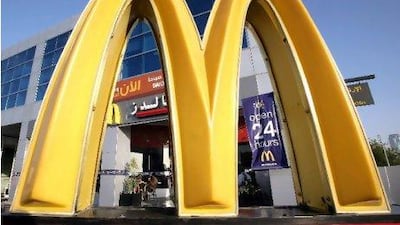Vegetable oil that has been used to cook French fries at McDonald's fast-food outlets across the UAE is being converted into fuel for lorries in the region's first biodiesel factory.
An Abu Dhabi company has struck a deal with the world's second-largest restaurant chain to convert the oil used in all 80 of its UAE kitchens into environmentally friendly fuel at a factory in Dubai.
The venture represents the GCC's first step into a biofuels market that is expected to account for 27 per cent of transport fuel worldwide by 2050.
"We're in competition with the state-owned fuel monopoly," said Karl Feilder, the chairman of the Neutral Group, which owns the biofuel company. He said the group would like to open more plants across the Emirates and the wider region.
The Neutral Group opened an office in Abu Dhabi in 2009 and was awarded a permit a year later from Dubai to produce biofuel through its subsidiary, Neutral Fuels.
A factory in Dubai takes waste oil from McDonald's kitchens, heats it and adds chemicals to turn it into a fuel that can power specially adapted lorries. The biofuel was first used in 12 vehicles starting in December and is due to power the McDonald's UAE fleet by the end of this year. Neutral Fuels was keen to use the McDonald's oil because of the company's cooking methods, which result in waste oil without too much animal fat, water or particles - a problem in other kitchens, said Mr Feilder. McDonald's uses more than 20,000 litres of oil a year, said Rafic Fakih, its managing director in the UAE.
"The quantity and the quality of their oil is very, very predictable, and that is magic for us," said Mr Feilder. "We know how much oil we're going to get from them and the quality we're going to get. If we started to get this from all over the place in the UAE you'd get all kinds of problems."
The factory's annual capacity is to start at 1 million litres and could increase if the company finds other suitable waste oil suppliers. Biofuels are one of the tools the transport sector is using to reduce carbon emissions many scientists agree contribute to climate change. Oil companies such as Total and ExxonMobil have put millions of dollars into research on the most efficient plants as the US, Brazil and other agricultural powerhouses have dedicated hectares to growing crops whose oils can be converted into fuel for planes and vehicles.
But biofuel production in the Middle East is still in its early days. Pressure to cut carbon emissions has led Etihad Airways, the Abu Dhabi airline, to collaborate on research into the feasibility of biofuels made from saltwater vegetation, and Ecobility, another biofuel company, has announced plans for a used vegetable-oil to fuel factory, but those are among few public developments in the UAE.
In the Gulf, the harsh climate makes the development of biofuels difficult while subsidised oil and gas resources are a disincentive to the industry.
"Usually it's linked to a massive agricultural setup in order to go big and in order to get those large multiples and the big bottom line," said Wadah Abusin, the commercial director for Ecobility, which is based in Dubai.
"Most of the plants that go up in the region are not going to be massive in terms of production," he said.
Biofuels have also been accused of contributing to the global food crisis as land that had been used to grow food crops is turned over to more lucrative biofuels feedstock.
"We're not going to put up a big farm in the middle of the desert and start cultivating," said Mr Abusin. "Since this is a sustainability-related project, we wanted to make sure that we can produce fuel without getting entangled into the food-versus-energy debate."
Biofuels represent a small share of the world energy market, with global production reaching 2.1 million barrels a day at its peak last year, according to the International Energy Agency, which represents the interests of 28 industrialised oil-importing countries.

